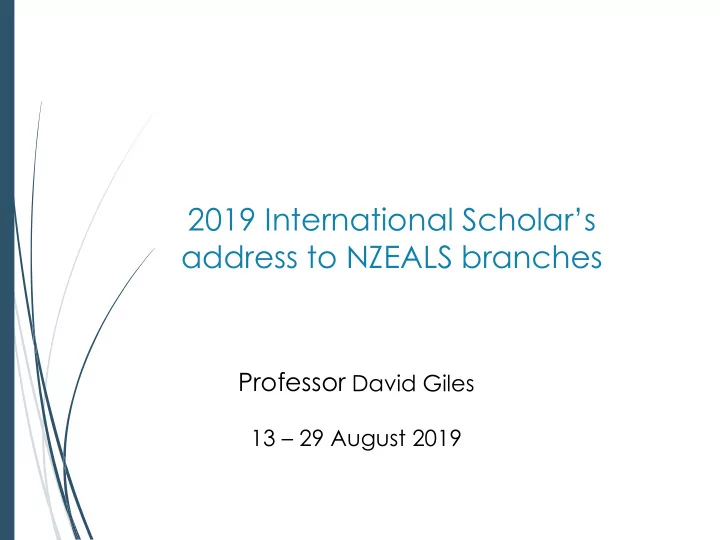

2019 International Scholar’s address to NZEALS branches Professor David Giles 13 – 29 August 2019
Introduction Acknowledgements NZ – South Australia Current role and status Teaching & Leadership experiences
My research journey Towards the phenomenological constructions of: 1. Relationships 2. Relational sensibilities 3. Relational leadership 4. Relational leadership as ethical leadership 5. Relational organisational cultures 6. Strengths-based, Appreciative practices 7. Life-centric, relational organisational cultures
Questions to ponder When is Education not relational? When is pedagogy not relational? When is curriculum not relational? When is leadership not relational?
My personal position on the priority of leadership 1. Leadership always involves a relational way of being 2. Leaders always make a difference to the relational culture within their organisations 3. Leaders should be equally attentive to efficiency and effectiveness as well as to ‘life’ between its members 4. A primary task of leadership is the mentoring of emergent and aspiring leaders 5. Leadership requires courage, and is not for the faint- hearted 6. Relational leadership relates to the minimum use of ‘power’ and a ‘call’ to robust dialogue
Relational Leadership in Education
#1 Relational Leaders : live ‘towards’ deep humane inter- relationships “… lives ‘towards’ a deep, moral and ethical commitment to critical, humane and connected inter-relationships”
Some signposts confuse
Some signposts inspire others, showing ethical intent, A seriousness, sobering and regular reality checks
T he purpose of education relates to the fullest formation of each student in terms of their dispositions, character (resilience, adaptability), capabilities, and understandings and skills, that enables inter-dependence. 1.The purpose of education has a relational intent 2.The educational process is inherently relational and experiential 3.The participants are relational beings 4.The organisation is a relational entity, the relational culture being more than the sum of the parts.
Purpose-driven ‘individuals’ Exploring our purpose as an individual Why do you do what you do? 1. What’s the big picture for you? 2. What do you stand for? 3. What are you aiming for? 4. What strengths are you developing? 5. What opportunities are you scoping? Developing? Wanting to develop? 6. What are the questions you ask yourself in terms of your contribution to the organisation in the next 3-5 years?
A purpose driven organisation What is the purpose of our organisation ? What is the special character of our organisation ? What do we collectively stand for? strengths-based … life-centric … relational … What do we want the organisation to be known for ? What is the organisation becoming ?
#2 Relational Leaders : live ‘out’ a way of being that authentically embodies ‘care-full’ relationships. ”… lives ‘out’ a way of being that authentically, models and embodies care-full relationships (individually and organisationally)”
“Your ... leadership task then, is to become relationally aware, to tune into patterns of relationship and collaboration – that is, to see, hear, sense, and affirm what is already happening in order to best relate to it and perform with it” (Whitney, Trosten-Bloom & Rader, 2010)
The ‘leadership’ journey
#3 Relational Leaders: ‘attune’ to the subtleties of the immediate, dynamic and relational context ‘… ‘attunes’ to the subtleties of the immediate, dynamic and relational context, through refined relational sensibilities”
"... leadership is the relational capacity to mobilise creative potential and turn it into positive power – to set in motion positive ripples of confidence, energy, enthusiasm, and performance – to make a positive difference in the world" (Whitney et al, 2010, p. 3)
#4 Relational Leaders: ‘ enact’ relational sensibilities. “… ‘enacts’ a. phronesis (practical wisdom, tacit knowing) which is context-specific, and involves relational sensibilities (such as attunement, tact, nous, resoluteness, improvisation, moral knowing amongst other sensibilities”
Relational sensibilities are integral to leadership, teaching & pedagogy Pathic sensibilities (van Manen & Li, 2002; van Manen) Relational sensibilities (Giles 2008, 2010 …)
Relational sensibilities are integral to relational leadership Nous Tact Attunement Improvisation Resoluteness Moral knowing …
Giles, D. L. (2010). Developing pathic [relational] sensibilities: A critical priority for teacher education programmes . Teaching and Teacher Education, 26( 8), 1511-1519 . Giles, D.L., Bills, A., & Otero, G. (2015) Pedagogical approaches for developing relational sensibilities in educational leaders. Reflective Practice, 16(6), 744-752 Giles, D. & Palmer, C. (2015). Exploring a Principal’s Practice during a Period of Significant Organizational Change: Relational Leadership and Sensibilities in Action. The Journal of Meaning- Centered Education. Volume 3, Article 1 Giles, D. L. (2015). A storyline of ideological change in a New Zealand primary school. International Journal of Organisational Analysis, 23(2), 320-332.
Summing up … A Relational Leader has a ‘ way of being’ that ‘ their being points ’ lives ‘towards’ • ‘ their being shows ’ lives ‘out’ • ‘ their being feels ’ ‘attunes’ to • ‘ their being enacts ’. ‘enacts’ •
Relational leadership as a way of ‘being in’ leadership Relational leadership is not another style of leadership rather a ‘ way of being ’ in leadership The term ‘Relational Leadership” is a reminder of what is critical to our practice as leaders Leadership is always relational, and relationships are the essence of leadership
Hi Family, Hope all is well, my thoughts are always with you. Relational Leadership is a way of being. It’s walking the talk through every interaction with the ability to connect; and understand the’ people’s and communities stories, and impacts with the natural ability to show empathy, listen, feel, and offer support in response by walking alongside and changing the narrative. Anthony Satrick Australian Indigenous Leader Yarrabah, Cairns Co-convenor, International Dialogue on Relational Leadership and Learning
Thank you
Stay in touch E dlgiles1@gmail.com Purchasing a book: www.routledge.com (search giles) www.bookdepository.com
Recommend
More recommend